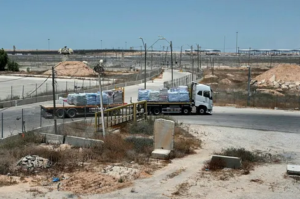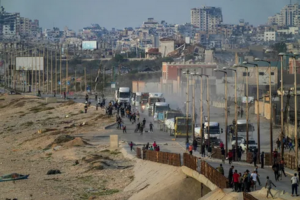UN says social breakdown and crime in Gaza limits aid distribution, endangers workers

A truck carrying humanitarian aid for Gaza Strip at the Kerem Shalom border crossing in June 2024
Jack Khoury reports in Haaretz on 24 June 2024:
The United Nations Office for the Coordination of Humanitarian Affairs (OCHA) issued a report on June 14 which said that the breakdown of public order and safety is increasingly endangering humanitarian workers and operations in Gaza.
Alongside the fighting, criminal activities and the risk of theft and robbery has effectively prevented humanitarian access to critical locations in Gaza, the report noted.
The UN World Food Programme (WFP) said that its aid convoys in Gaza were looted by “desperate people.” “Lawlessness born out of desperation,” the report says, “is hampering deliveries from the Kerem Shalom crossing.”
“It is getting harder to do our job,” WFP’s Deputy Executive Director, Carl Skau, said. “Staff spend five to eight hours waiting at checkpoints every day. Missiles hit our premises, despite being deconflicted. The breakdown of law and order means we also face looting and violence amid a large security vacuum.”
The WFP “fears that southern Gaza could soon see the same catastrophic levels of hunger recorded previously in the north,” and Skau said that the situation in the south is “quickly deteriorating.” The report did say that “there has been improvement in assistance in northern Gaza,” as aid supply has increased through Israel’s new West Erez Crossing.
On Sunday, AFP reported, citing the UN’s health agency, that the IDF’s daily ‘humanitarian pause’ has had “no impact on deliveries of badly needed supplies.” The UN blames Israel for the situation, but Israel has rejected these allegations, explaining that it allows hundreds of aid trucks to enter the southern Gaza Strip.
The UN and other aid organizations claim that the Kerem Shalom crossing point is only partially functioning because of active fighting in the area. “It’s not just a question of civil order, but also the fact that you often have to cross battlefields,” William Schomburg, the head of the Red Cross’ Gaza division said in a briefing on Friday, “This whole area is particularly complicated to navigate for reasons linked to the hostilities and for reasons linked to general security.” There are already signs of the breakdown in public order and the use of arms to loot in Deir al-Balah and the central Gaza Strip.
A Deir al-Balah resident told Haaretz that “Israel attacks every sign of government affiliated with Hamas, but there is no real alternative, so every family or clan with weapons tries to show presence. This is also expressed in the control of resources and humanitarian trucks.”
Aid teams in Gaza also warned that the lack of coordination and sufficient protection by Israel endangers the distribution and makes it difficult to ensure access to vital roads and crossing points. The teams say that attacks on Hamas’ civil police forces have also resulted in the collapse of public order in Gaza, an increase in theft of food supplies and increased risk to aid workers.

Palestinians storm trucks loaded with humanitarian aid in central Gaza, May 2024
The Gisha human rights organization said that “Israel claims that it does not limit aid to Gaza,” but that the severe traffic jams that Israel blames for the limited aid distribution “is the product of its ignoring its responsibility to the civilian population in Gaza, and of not fulfilling its obligations, both as a fighting party and as an occupying power, not only to allow sufficient aid access to all the crossings into Gaza, but also to ensure that the aid workers and aid shipments can reach the citizens.”
At the same time, hunger in Gaza is growing. In the past few days, hospitals allowed journalists access and report on the patients’ condition. The reports and pictures from these tours show severe hunger, including malnourished infants and premature babies.
Gazan aid workers link the severity of the humanitarian aid situation to Israel’s takeover of the Rafah Crossing, which prevents the entry of goods to Gaza and the departures of severe medical patients. Gisha and Physicians for Human Rights-Israel report that the takeover of the Rafah Crossing has made it impossible for the tens of thousands of sick and critically injured patients to leave Gaza for treatment.
On June 12, World Health Organization Director-General Dr. Tedros Adhanom Ghebreyesus said that “a significant proportion of Gaza’s population is now facing catastrophic hunger and famine-like conditions,” and that “over 8,000 children under five years old have been diagnosed and treated for acute malnutrition, including 1,600 children with severe acute malnutrition.”
This article is reproduced in its entirety
